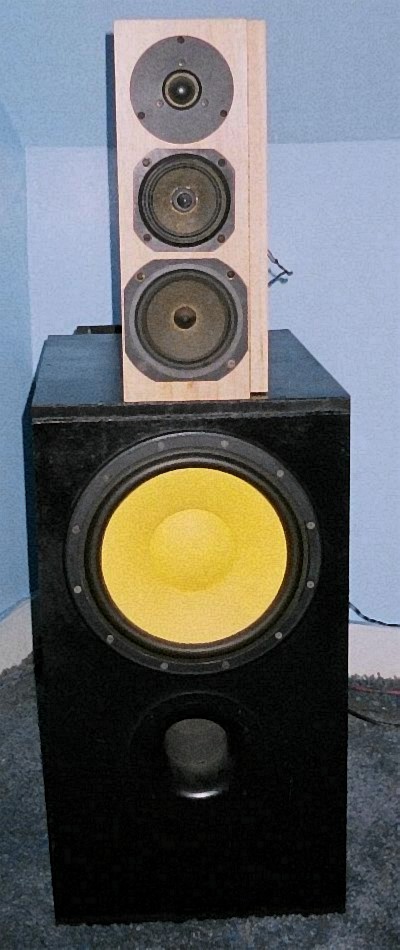 |
Audio Asylum Thread Printer Get a view of an entire thread on one page |
For Sale Ads |
 |
Audio Asylum Thread Printer Get a view of an entire thread on one page |
For Sale Ads |
84.107.197.14
In Reply to: RE: And I'm Boris Spasky posted by Triode_Kingdom on April 07, 2011 at 21:51:55
there are quite a few cable sellers that speak of the so called diode effect between strands. Unless there is science behind it. It is just anecdotal.That said. I also avoid multistranded wire like the plague. Unless it is litz. But I don't do that because I have actually a/b it. I once changed a run of stranded speaker cable with solid core and since then I've just gone solid core. So I do a lot of things without scientific basis or semi-scientific. Such as choke input. Non magnetic parts as much as possible. That's about it.
(Edit) Fixed the plague spelling.
To infinity and beyond!!!
Edits: 04/09/11Follow Ups:
Oxidation is the problem with stranded wire. The oxide layer that form on the surface of the wire is not as conductive as the base metal. Cuprous Oxide is a semi-conductor and was actually used in primitive solid-state rectifiers. Most metal oxides are dielectrics, and therefore insulate. Hence the problem with aluminum wire in house wiring, where due to wire oxidation, the conductive area at a connector shrinks to the point where there is a high resistive drop with current, which heats up the connection to the point of igniting a fire. Therefore, if you use stranded wire, a non-airtight crimp connection can result in a reduced conductivity as the strands oxidize over time.
Dental plaque is a biofilm, usually colorless, that develops naturally on the teeth.Plague is caused by the organism Yersinia pestis
Both should be avoided like the... you know.
Edits: 04/08/11
.
To infinity and beyond!!!
is also the result of the focal death of cells in a tissue culture monolayer resulting from the spread of an infectious virus from cell to cell, originating from virus infecting a single cell at the center of the focus, under a layer of agarose. I just had to say that.
Bas
"I also avoid multistranded wire like the plaque."
Because you and most everybody else know it sounds bad.
The only ones that don't know it are the ones that
scream loudly with their fingers in their ears -
"There Is No Scientific Evidence To Prove That!!!"
So they contentedly go out and buy zip cord
for their speaker wire and proclaim it's great.
DanL

Dan, I think you are reaching conclusions not supported by the evidence. I bet if you took that zip cord and had solid wire installed inside it, it still wouldn't sound as good as other options.
Russ
I had Z-3 Monster speaker cables.
I tried Radio Shack 18ga solid core wire.
I much preferred the Radio Shack wire.
I then tried the NeoTech OCC wire and
heard further improvement.
I tried both the teflon and PVC jacket.
Each had an appeal but I found that if I
used one on the (+) and one for the (-)
they complimented each other quite well.
Is that enough evidence for you?
DanL

So Dan - you are saying then that the people who own Citation II amps that I rebuilt with some stranded wire and who LOVE the tone are all in denial - that those amps really sound bad??
That's what your pronouncement seems to say - at least to me.
BTW - the wire leads from the Citation II output trafos - stranded. And we ALL know how bad they sound.
Mr. McShane, your rebuilds are, by all accounts superb. I trust your tube information implicitly. (I read you even like puppies). But your argument doesn't hold water.
Just because the Citation II transformers sound great doesn't mean they wouldn't be better with solid core or Litz wiring. Same with your rebuilds.
From a transformer manufacturing standpoint, either would be impractical, solid core for flexibility issues and Litz for time of manufacturing (termination) issues.
But I certainly do agree on the basic quality of lots of things we buy that don't follow the "rules".
Stuart
WHOA! Don't touch that!
Hi Stuart,Dan said "sounds bad" in his earlier post - that's what I was addressing. So yes indeed my statement does hold water when applied to that particular statement - at least in my humble opinion.
I refuse to generalize regarding wire - or ALMOST anything else in judging sonics. There are exceptions to nearly every rule, and in many cases compelling cases can be made on both sides of an argument. Just FYI - I use both solid and stranded, and even some Litz wire on occasion.
BTW, thank you for the kind words!! They are very much appreciated.
Edits: 04/08/11
Stuart
I use old crossover inductor wire
for my secondary system in the kitchen.
Works great.
DanL

So what do you use for speaker interconnect wire? Solid wire seems pretty impractical.
Or, the Home Depot Special cables which use a compression lug on the end, preventing the oxidation that David McGown mentioned.
Litz wiring is great, but a bit expensive.
Stuart
WHOA! Don't touch that!

Mikey
For the main speakers -
I use 18ga OCC copper teflon on the positive
and 18ga OCC copper PVC on the negative.
For the Plate Amp to the subwoofer -
(Mounted together so no flexing involved)
I use 10ga generic copper house wire.
I strip off the PVC coating and
spiral wrap it with teflon tape and
finally some shrink wrap over it.
All of it solid core 8^D
DanL

Post a Followup:
| FAQ |
Post a Message! |
Forgot Password? |
|
||||||||||||||
|
||||||||||||||
This post is made possible by the generous support of people like you and our sponsors: